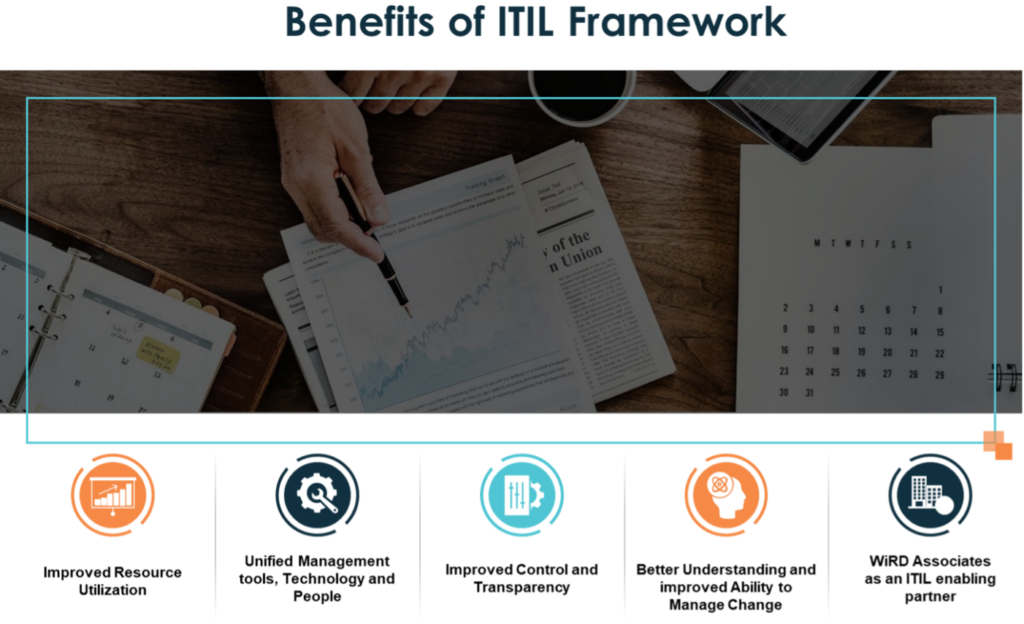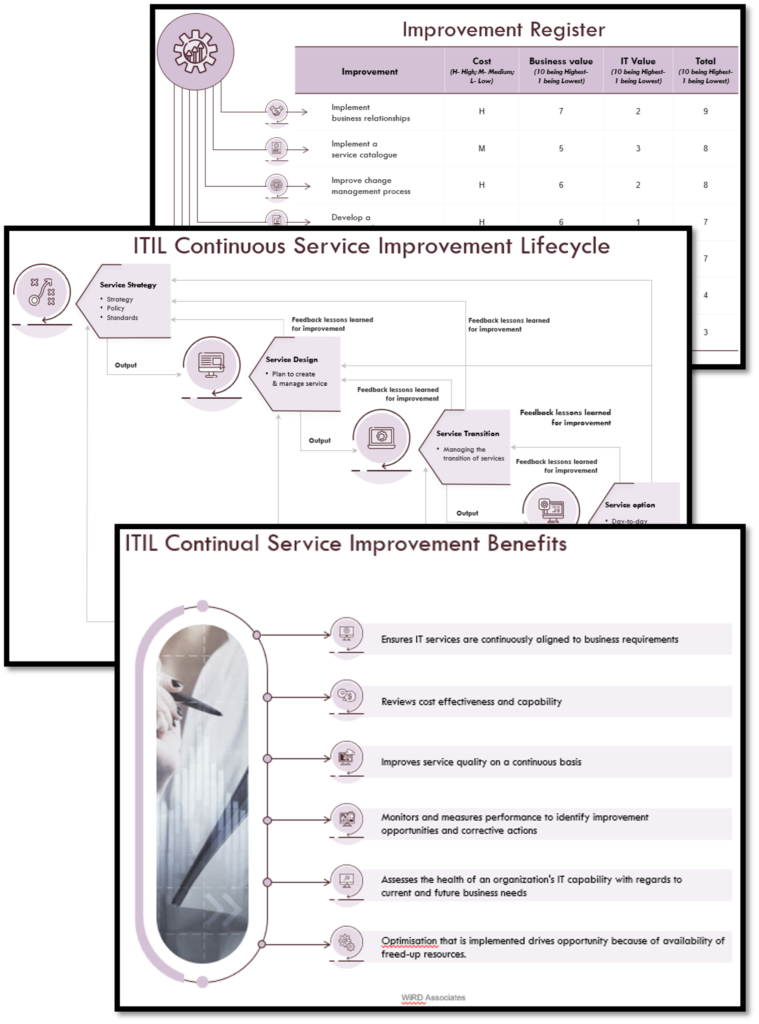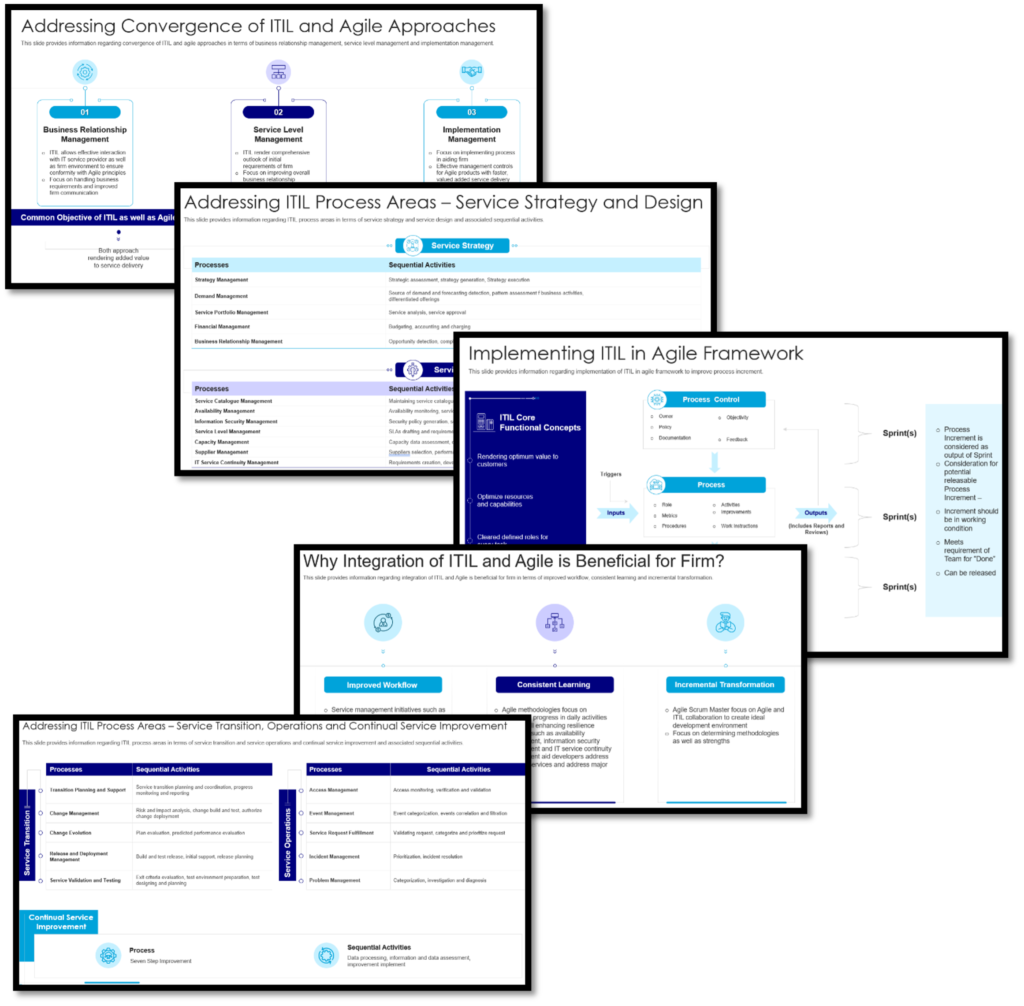Today, ITIL no longer refers to “Information Technology Infrastructure Library”—instead, it is a standalone term.
How can ITIL® enable organisations to accelerate digital transformation and hence greater agility in their organisations?
Understanding what ITIL can do to enable the agility required in the modern, ever-evolving, digital world.
ITIL provides a solid foundation for organizations undergoing digital transformation. Its best practices help organizations manage and optimize their IT services, which is crucial for successful digital initiatives. ITIL can help organizations accelerate digital transformation by:
- Providing a framework for managing IT services that aligns with business goals and strategies.
- Helping organizations identify and prioritize improvement opportunities and effective change management.
- Streamlining roles, activities, and processes, while consistently improving and adapting where needed.
- Some frameworks within ITIL have evolved over time for specific practices but the core concepts and principles remain virtually unchanged for companies and organisations.
- Professionals and Professionals Organizations must embrace this concept to remain competitive and relevant.

The model elaborates the various interrelated processes and function for basic ITIL adoption, assessing and improvising the current processes and continuously planning for improvements based upon feedback and necessary business requirements. The adoption starts with Planning the service according to the business need then Building the service with defined processes which in turn helps in maintaining the balance of disruptions and the later Manage those services with proper Support & Monitoring with the help of better tools for improving the service.
ITIL® is structured around a Service Lifecycle which consists of the five phases shown below. All these lifecycle modules go through a Continuous Service Improvement phase to assure best plan.

The adaptable framework of ITIL 4 is for managing services within the current digital realm. By means of the best practice modules, ITIL 4 assists in optimising digital technologies and value is co-created with consumers, using business driven strategy, and digital transformation embraced.
The latest evolution of ITIL, (ITIL® 4), continues the core guidelines of previous versions and provides comprehensive, practical, and proven guidance. Traditional service management activities are supported like (IM) incident management and (CI) continuous improvement. It can also be aligned to generative and transformative technologies, such as AI, Cloud, and Automation.

“It is the basis for the international standard ISO20000 and the workflows in many service management software platforms. It also works seamlessly with DevOps, Lean, and Agile, and Axelos’ products such as PRINCE2® and AgileSHIFT®.”

Each ITIL 4 module is accompanied by a comprehensive core guidance publication and a globally recognized professional certification, from which millions of professionals worldwide have benefitted.

ITIL 4 can help you to:
- understand how IT impacts strategy and how professionals can utilize the four dimensions of service management in a wider business context
- use the guiding principles to navigate change, streamline work and introduce flexible and collaborative working practices
- break down silos by encouraging a holistic, systems-thinking approach to value co-creation
- build trusted relationships with stakeholders and develop effective and timely communications
- work with complex, adaptive systems and flexible processes that can adapt to changing environments
- learn the common language of IT-enabled service delivery, to boost your digital career progression and set you apart from your peers.
“How relevant is ITIL today?”.
ITIL is relevant and adopted widely in today’s digital technology sphere. To thrive and survive, it must become their culture – IT evolves and ITIL is a blueprint while guiding that change.
About ITIL: Addressing Information Technology Infrastructure Library (ITIL) Process
- ITIL focus on standardization of selection, planning, delivery and IT support services in order to optimize efficiency and maintain levels of service.
- Principles Associated to ITIL are:
- Rendering optimum value to customers
- Focus on resources and capabilities optimization.
- Render reliable services
- Management of processes with specific goals
- Cleared defined roles for every task.
- Key Elements of ITIL
- Capabilities – specialized skills and abilities of firm to generate value.
- Functions – self-contained subsets of firm to achieve specific task.
- Processes – structured set of activities to achieve specific goal.
- Resources – raw material include money, equipment, time, and staff to render service.
Many innovative organizations, including Spotify and Vodafone, have already increased their efficiency and customer satisfaction by adopting ITIL 4.

Find out about the ITIL®4 certifications here

ITIL 4 MANAGING PROFESSIONAL, ITIL 4 STRATEGIC LEADER, ITIL 4 ITIL 4 PRACTICE MANAGER, EXTENSION MODULES and ITIL4 MASTER
As can be seen from this blog, ITIL, if interpreted and applied correctly, can help to optimise any organisation’s journey to a fully-fledged digital business model in ways that are cost effective and highly efficient.
In WiRD’s experience, many organisations who have invested resources in ITIL, are only using a fraction of the wisdom and capabilities. It can be a very powerful enabler of digital transformation enabled by formal enterprise architecture. What has your experience been in this regard? How effectively is your organisation using its investment in ITIL? How are the ITIL resources applying themselves to continuously improve their environment.
Our subsequent blogs will elaborate on ITIL key areas and concepts:

